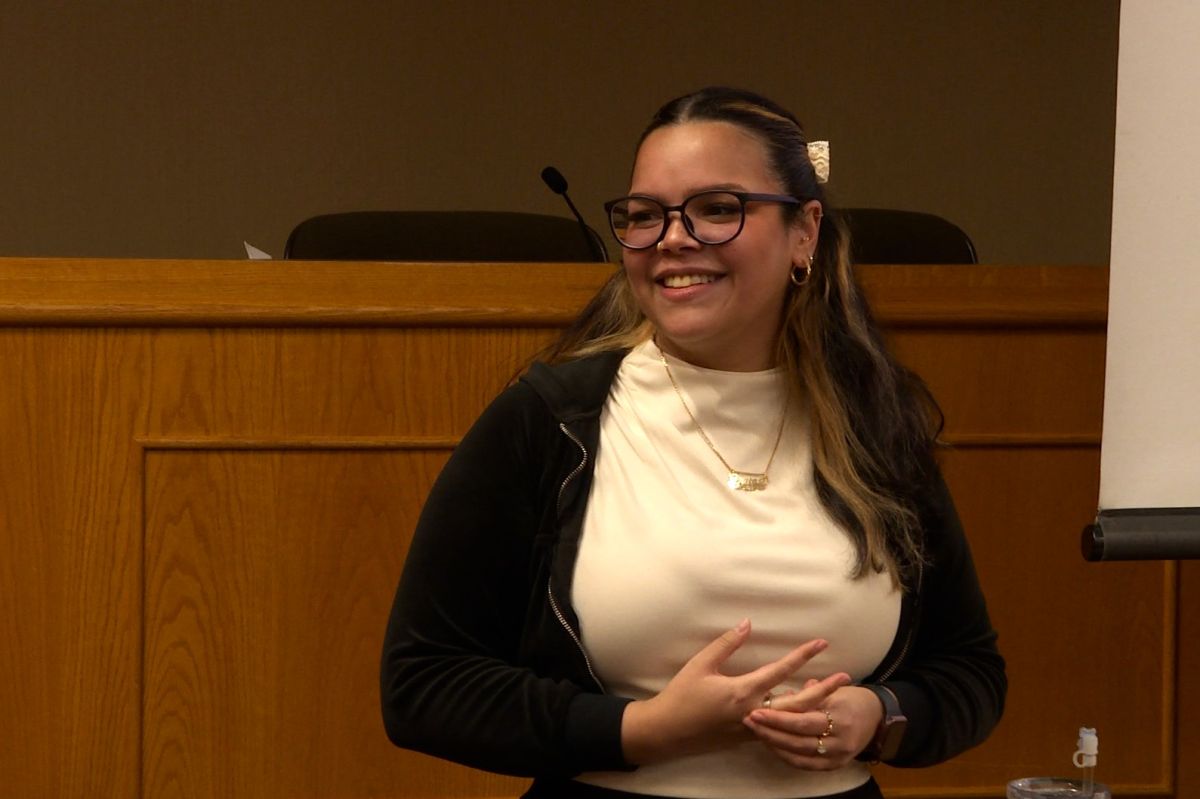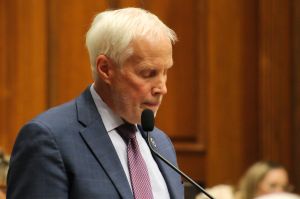
Grace Alvarez Rosario, an Indiana University Maurer School of Law , is the student director of the Protective Order Project. (Lauren Tucker, WTIU)
Between casual conversations and lighthearted simulations, Indiana University Maurer School of Law students brushed up on a heavy topic — working on cases involving domestic violence, sexual offenses, stalking and harassment.
Grace Alvarez Rosario, student director of the Protective Order Project, leads the training. She knows the job can be tough — but it’s also rewarding. The Protective Order Project is a free legal service for the IU community, Monroe County residents and residents of nearby counties.
“How can survivors take this awful experience that they've lived through that nobody else is going to be able to relate to in the same way that they can, and just turn it into something beautiful, turn it into something more?” Alvarez Rosario said.
The main goal of the the Protective Order Project is in the name: volunteers with the project help clients get protective orders. They’re civil orders — not criminal charges — that prohibit perpetrators from contacting or harming a victim. That might look like a temporary restraining order, a no contact order or a civil protection order.
If a perpetrator violates an order, they could be arrested.
Faculty and attorneys work with Maurer law students to help clients. Maryann Williams is the faculty director and an attorney with 35 years family law experience.
The Protective Order Project launched in 1989, but Williams helped make the program what it is today — an experience that benefits future lawyers. This academic year, the project reported 126 volunteers.
“I sort of looked at it and felt like, why aren't we using the students to do it? As opposed to volunteer attorneys,” Williams said. “So we use Certified Legal interns who are allowed to go and practice in court.”
The project works with Maurer’s Civil Protection Order Clinic and its director Amy Applegate.
“It is a nice opportunity for students, and there is a need in our community for this,” Applegate said. “And that's why we are very happy.”
Steps toward securing a protective order
The Protective Order Project can be reached anytime by email or phone at 812-855-4800.
Once a survivor contacts or is referred to the project, an experienced volunteer will request information before officially taking someone on as a client.
“They'll be asking the questions, writing down the incidents,” Alvarez Rosario said. “Making sure we get random stuff that people don't really think about, like birth dates, addresses, witness information.”
If their needs match the project’s services, survivors will sign agreements and learn about the next steps. In the 2023-2024 academic year, they took on 37 cases. If a case is rejected because of its complexity or scope, Alvarez Rosario said volunteers will walk survivors through other options.
Clients are usually prepared for a hearing with a judge to secure a protective order, though sometimes judges will grant one without a hearing.
“The way that I like to phrase it is that, we make sure that we're with them as much as they're with us,” Alvarez Rosario said.
During this process, Williams said volunteers use “motivational interviewing.”
“That motivational interviewing that we do early on is so important to build that rapport with the client, make sure that they can trust us and sort of undo those layers of abuse or emotional neglect that they have experienced for a number of years,” Williams said.
Project attorneys, such as Williams or Applegate, might also send a cease-and-desist letter or do a settlement agreement that ends the dispute. Even if there’s a criminal case in the works, victims can still seek a protective order, Applegate said.
“They come to us for any number of reasons, or sometimes we help them file their protective order,” Applegate said. “But there are times when people have other options that might be more suitable for them.”
Empowering survivors and training better lawyers
In addition to typical training and experience with the law school, Protective Order Project volunteers have specialized methods for working on sensitive cases.
Applegate worked with experts in psychology and intimate partner violence to create a quick method for screening the project’s potential clients. It’s called MASIC-S, Applegate said. It helps volunteers gauge the extent of violence and if someone needs to be referred to a victim’s advocate.
“That can happen with Middle Way House with whom we have a great relationship,” Applegate said.
If the project is working with an IU students, they'll be connected to The Office for Sexual Violence Prevention and Victim Advocacy.
The issues Protective Order Project volunteers work with are prevalent in Indiana, according to advocacy organizations such as the National Domestic Violence Hotline.
(Story continues below the embeded report.)
REPORT: 2020 National Domestic Violence Hotline - Indiana statistics
Born in Puerto Rico, Alvarez Rosario is fluent in Spanish. She said other volunteers can speak multiple languages.
“I do want to empower other communities and other identities,” Alvarez Rosario said. “It might be a little bit harder, it might be against cultural norms to try and get help, and we completely understand that.”
In these cases, families fight, neighbors battle, friends turn against each other and survivors try to move on. It can be heavy emotionally, but Alvarez Rosario said she knew the Protective Order Project was right for her career, because of its focus on empowering survivors.
When the case is closed, Alvarez Rosario said clients are thankful.
“She was like, ‘I just want to thank you for being so empathetic,” Alvarez Rosario said. “‘Because everyone that I've talked to about this has just been like, why are you acting this way? Why are you reacting this way? And you just, you just heard me out, and you validated my feelings, and you held my hand this whole process.’”
Aubrey is our higher education reporter and a Report For America corps member. Contact her at aubmwrig@iu.edu or follow her on X @aubreymwright.











